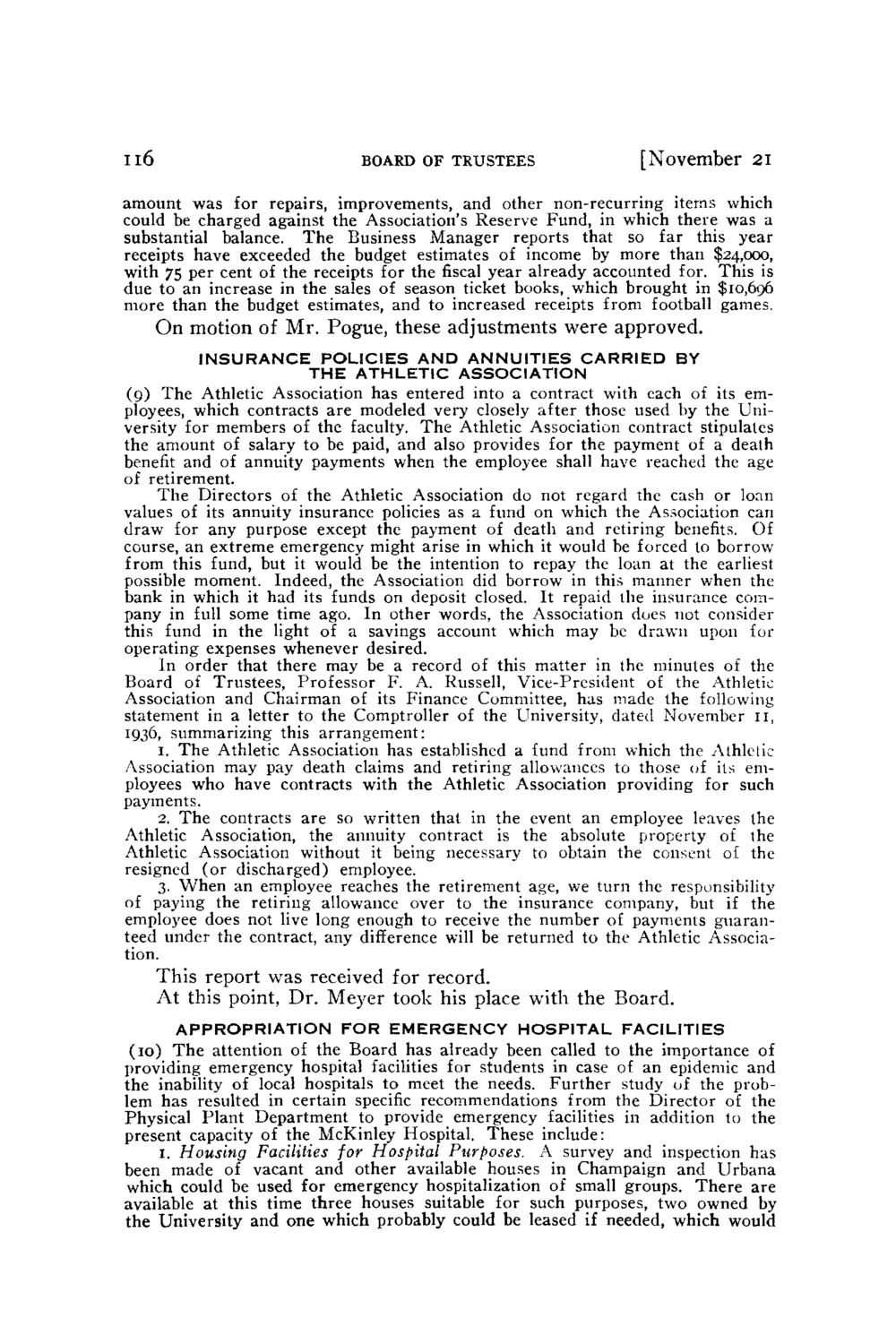| |
| |
Caption: Board of Trustees Minutes - 1938
This is a reduced-resolution page image for fast online browsing.

EXTRACTED TEXT FROM PAGE:
n6 BOARD OF TRUSTEES [November 2i amount was for repairs, improvements, and other non-recurring items which could be charged against the Association's Reserve Fund, in which there was a substantial balance. The Business Manager reports that so far this year receipts have exceeded the budget estimates of income by more than $24,000, with 75 per cent of the receipts for the fiscal year already accounted for. This is due to an increase in the sales of season ticket books, which brought in $10,696 more than the budget estimates, and to increased receipts from football games. On motion of Mr. Pogue, these adjustments were approved. INSURANCE POLICIES AND ANNUITIES CARRIED BY THE ATHLETIC ASSOCIATION (9) The Athletic Association has entered into a contract with each of its employees, which contracts are modeled very closely after those used by the University for members of the faculty. T h e Athletic Association contract stipulates the amount of salary to be paid, and also provides for the payment of a death benefit and of annuity payments when the employee shall have reached the age of retirement. T h e Directors of the Athletic Association do not regard the cash or loan values of its annuity insurance policies as a fund on which the Association can draw for any purpose except the payment of death and retiring benefits. Of course, an extreme emergency might arise in which it would be forced to borrow from this fund, but it would be the intention to repay the loan at the earliest possible moment. Indeed, the Association did borrow in this manner when the bank in which it had its funds on deposit closed. It repaid the insurance company in full some time ago. In other words, the Association does not consider this fund in the light of a savings account which may be drawn upon for operating expenses whenever desired. In order that there may be a record of this matter in the minutes of the Board of Trustees, Professor F. A. Russell, Vice-President of the Athletic Association and Chairman of its Finance Committee, has made the following statement in a letter to the Comptroller of the University, dated November II, 1936, summarizing this arrangement: 1. The Athletic Association has established a fund from which the Athletic Association may pay death claims and retiring allowances to those of its employees who have contracts with the Athletic Association providing for such payments. 2. T h e contracts are so written that in the event an employee leaves the Athletic Association, the annuity contract is the absolute property of the Athletic Association without it being necessary to obtain the consent of the resigned (or discharged) employee. 3. W h e n an employee reaches the retirement age, we turn the responsibility of paying the retiring allowance over to the insurance company, but if the employee does not live long enough to receive the number of payments guaranteed under the contract, any difference will be returned to the Athletic Association. This report was received for record. At this point, Dr. Meyer took his place with the Board. APPROPRIATION FOR EMERGENCY HOSPITAL FACILITIES (10) T h e attention of the Board has already been called to the importance of providing emergency hospital facilities for students in case of an epidemic and the inability of local hospitals t o meet the needs. F u r t h e r study of the problem has resulted in certain specific recommendations from the Director of the Physical Plant Department to provide emergency facilities in addition to the present capacity of the McKinley Hospital. These include: I. Housing Facilities for Hospital Purposes. A survey and inspection has been made of vacant and other available houses in Champaign and Urbana which could be used for emergency hospitalization of small groups. There are available at this time three houses suitable for such purposes, two owned by the University and one which probably could be leased if needed, which would
| |